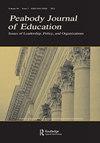Trekking Across Some Rough Terrain: Rural Teacher Education for Multilingual Students
Q2 Social Sciences
引用次数: 0
Abstract
ABSTRACT Although the number of multilingual (ML) students continues to rise nationally, little scholarly attention has been paid to the education of rural ML students and families. There is critical need to better understand who rural ML students are and how to align their linguistic knowledge and strengths with appropriate instructional practices. This article examines the current state of research on rural teacher education for ML students. It addresses two areas of the 10 research priorities articulated by the National Rural Education Association’s (NREA) Research Agenda 2016–2021 and enhanced and extended in 2022–2027: building the capacity to meet the needs of diverse populations and teacher-leader preparation for rural schools. A search of four major research databases for work in this area revealed 27 empirical studies published between 2010 and 2022. Three main research categories emerged from the review: (1) six studies on the beliefs and perceptions of teachers on their education and preparation for rural MLs; (2) eight studies related to rural teacher identity and MLs; and (3) 13 studies on teacher leadership, professional development, and collaboration and partnerships for rural MLs. Implications and recommendations for future rural research on ML students in the United States are provided.徒步穿越崎岖的地形:多语种学生的乡村教师教育
摘要尽管全国多语言(ML)学生的数量持续增加,但学术界对农村ML学生和家庭的教育关注甚少。迫切需要更好地了解农村ML学生是谁,以及如何将他们的语言知识和优势与适当的教学实践相结合。本文考察了ML学生乡村教师教育的研究现状。它涉及国家农村教育协会(NREA)《2016-2021年研究议程》提出的10个研究重点中的两个领域,并在2022-2027年得到加强和扩展:建设满足不同人群需求的能力和为农村学校做好教师领导准备。对四个主要研究数据库的搜索显示,2010年至2022年间发表了27项实证研究。审查产生了三个主要研究类别:(1)六项关于教师对其教育和农村MLs准备的信念和看法的研究;(2) 八项关于农村教师身份和MLs的研究;以及(3)关于教师领导力、专业发展以及农村MLs的合作与伙伴关系的13项研究。对未来美国ML学生的农村研究提供了启示和建议。
本文章由计算机程序翻译,如有差异,请以英文原文为准。
求助全文
约1分钟内获得全文
求助全文
来源期刊

Peabody Journal of Education
Social Sciences-Education
CiteScore
2.20
自引率
0.00%
发文量
43
期刊介绍:
Peabody Journal of Education (PJE) publishes quarterly symposia in the broad area of education, including but not limited to topics related to formal institutions serving students in early childhood, pre-school, primary, elementary, intermediate, secondary, post-secondary, and tertiary education. The scope of the journal includes special kinds of educational institutions, such as those providing vocational training or the schooling for students with disabilities. PJE also welcomes manuscript submissions that concentrate on informal education dynamics, those outside the immediate framework of institutions, and education matters that are important to nations outside the United States.
 求助内容:
求助内容: 应助结果提醒方式:
应助结果提醒方式:


